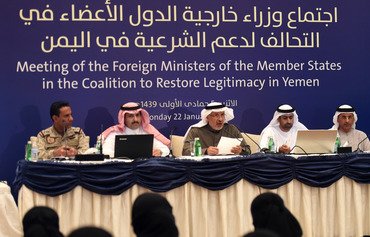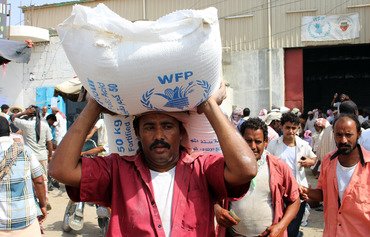Saudi Arabia and the UAE are jointly funding a $500 million initiative to bridge Yemen's humanitarian needs gap and ensure food reaches the most needy.
King Salman Humanitarian Aid and Relief Centre (KS Relief) general supervisor Abdullah al-Rabeeah and UAE Minister of State for International Co-operation Reem al-Hashemi launched the initiative at a November 20th press conference.
The joint Saudi-UAE initiative will provide additional support of $500 million to bridge the gap in humanitarian food aid through UN and international, regional and local organisations, al-Rabeeah said.
The "Imdad" initiative is expected to benefit between 10 and 12 million Yemenis.
![A displaced Yemeni child looks at boxes of Saudi-provided humanitarian food aid on the hood of a car at a camp in Yemen's northeastern province of Marib on January 26th. [Abdullah al-Qadry/AFP]](/cnmi_am/images/2018/12/12/15674-Yemen-child-food-600_384.jpg)
A displaced Yemeni child looks at boxes of Saudi-provided humanitarian food aid on the hood of a car at a camp in Yemen's northeastern province of Marib on January 26th. [Abdullah al-Qadry/AFP]
It will focus on the most vulnerable segments of the population: malnourished children, children under the age of 5, schoolchildren, pregnant women, nursing mothers and women who are the family breadwinners, the elderly and the sick.
Land, sea and air corridors
Aid is now delivered to Yemen via 27 land, sea and air corridors -- after five new corridors have recently been opened -- which will enable international organisations to better reach the targeted groups.
"The Imdad initiative is an extension of the humanitarian efforts made by Saudi Arabia and the UAE to alleviate the suffering of Yemenis," Yemen's Deputy Minister of Human Rights Nabil Abdul Hafeez told Al-Mashareq.
He stressed the importance of bridging the food gap and the need to develop action plans to ensure the flow of food aid via the five additional corridors that have been opened.
The aid corridors need to be secure, so international organisations can use them to conduct additional relief operations for those in greatest need, he said.
"The Higher Relief Committee is developing a strategic plan that includes mechanisms for working with international humanitarian organisations and civil society organisations that participate in the distribution of humanitarian aid," he said.
He called on international aid organisations to assess previous relief operations and identify flaws in the process so these can be addressed and relief operations can improve, both in terms of the type of aid and the number of recipients.
The Imdad initiative has opted to focus on specific groups, hence greater efforts are required to reach targeted segments via schools, hospitals, prenatal care centres and patient care centers, economist Abdul Jalil Hassan told Al-Mashareq.
"Reaching the targeted groups requires a follow-up mechanism to reach them in their areas, particularly malnourished children, the elderly and the sick," he said.
It is vital that international organisations step in to help those not covered by the Imdad initiative, he added, especially internally displaced persons (IDPs), who are the most affected and need all types of food and relief aid.
Enormous need for assistance
The allocation of $500 million by Saudi Arabia and the UAE to bridge the food gap was "an outstanding gesture in support of the Yemeni people", political analyst Waddah al-Jalil told Al-Mashareq.
The people of Yemen "have been devastated by the war and the coup mounted by the Iran-backed Houthis (Ansarallah)", he said.
"The Yemeni people’s need for relief aid, especially food aid, is great, and what has been allocated for Yemen is still modest, relative to the humanitarian crisis and suffering caused by the war," he added.
The war, now in its fourth year has led to extensive displacement and has exacerbated the problem of poverty and unemployment, he said.
International organisations sometimes work with local contractors to distribute the aid, he added, and this puts it at risk of being lost or waylaid as a result of corruption and not delivered to the intended recipients.
"The absence of a real state with institutions that undertake the distribution of humanitarian aid to deserving recipients based on well thought out plans puts a portion of this aid at risk of being tampered with," he said.
This in turn "increases the suffering of the targeted groups", al-Jalil said.

![A displaced Yemeni child sits next to boxes of Saudi-provided food aid at a camp in Yemen's Marib province on January 26th. [Abdullah al-Qadry/AFP]](/cnmi_am/images/2018/12/12/15672-Yemen-Saudi-aid-600_384.jpg)






Saudi Now news
Reply8 Comment(s)
The file of hostages.
Reply8 Comment(s)
We don’t want assistance. The war has stopped billions of dollars in revenues for the country, and we’ve become displaced people and beggars.
Reply8 Comment(s)
Show them force and we'll support you!
Reply8 Comment(s)
Here, assistance is only handed to those who have connections and who are relatives of employees. Most of the poor receive no assistance.
Reply8 Comment(s)
O, God, please preserve Yemen and its people! O, God, please unite Arabs and have mercy on us, be with us and unify our hearts in Your obedience!
Reply8 Comment(s)
Stop the war on Yemen, o, sons of Jews!
Reply8 Comment(s)
Assistance hasn't reached the needy countries.
Reply8 Comment(s)